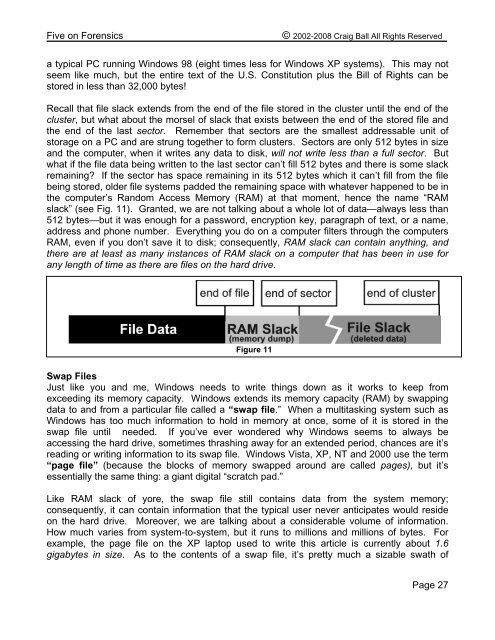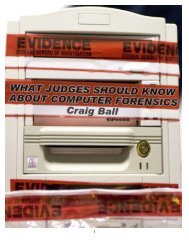Five on Forensics Page 1 - Craig Ball
Five on Forensics Page 1 - Craig Ball
Five on Forensics Page 1 - Craig Ball
You also want an ePaper? Increase the reach of your titles
YUMPU automatically turns print PDFs into web optimized ePapers that Google loves.
<str<strong>on</strong>g>Five</str<strong>on</strong>g> <strong>on</strong> <strong>Forensics</strong><br />
© 2002-2008 <strong>Craig</strong> <strong>Ball</strong> All Rights Reserved<br />
a typical PC running Windows 98 (eight times less for Windows XP systems). This may not<br />
seem like much, but the entire text of the U.S. C<strong>on</strong>stituti<strong>on</strong> plus the Bill of Rights can be<br />
stored in less than 32,000 bytes!<br />
Recall that file slack extends from the end of the file stored in the cluster until the end of the<br />
cluster, but what about the morsel of slack that exists between the end of the stored file and<br />
the end of the last sector. Remember that sectors are the smallest addressable unit of<br />
storage <strong>on</strong> a PC and are strung together to form clusters. Sectors are <strong>on</strong>ly 512 bytes in size<br />
and the computer, when it writes any data to disk, will not write less than a full sector. But<br />
what if the file data being written to the last sector can’t fill 512 bytes and there is some slack<br />
remaining? If the sector has space remaining in its 512 bytes which it can’t fill from the file<br />
being stored, older file systems padded the remaining space with whatever happened to be in<br />
the computer’s Random Access Memory (RAM) at that moment, hence the name “RAM<br />
slack” (see Fig. 11). Granted, we are not talking about a whole lot of data—always less than<br />
512 bytes—but it was enough for a password, encrypti<strong>on</strong> key, paragraph of text, or a name,<br />
address and ph<strong>on</strong>e number. Everything you do <strong>on</strong> a computer filters through the computers<br />
RAM, even if you d<strong>on</strong>’t save it to disk; c<strong>on</strong>sequently, RAM slack can c<strong>on</strong>tain anything, and<br />
there are at least as many instances of RAM slack <strong>on</strong> a computer that has been in use for<br />
any length of time as there are files <strong>on</strong> the hard drive.<br />
Figure 11<br />
Swap Files<br />
Just like you and me, Windows needs to write things down as it works to keep from<br />
exceeding its memory capacity. Windows extends its memory capacity (RAM) by swapping<br />
data to and from a particular file called a “swap file.” When a multitasking system such as<br />
Windows has too much informati<strong>on</strong> to hold in memory at <strong>on</strong>ce, some of it is stored in the<br />
swap file until needed. If you’ve ever w<strong>on</strong>dered why Windows seems to always be<br />
accessing the hard drive, sometimes thrashing away for an extended period, chances are it’s<br />
reading or writing informati<strong>on</strong> to its swap file. Windows Vista, XP, NT and 2000 use the term<br />
“page file” (because the blocks of memory swapped around are called pages), but it’s<br />
essentially the same thing: a giant digital “scratch pad.”<br />
Like RAM slack of yore, the swap file still c<strong>on</strong>tains data from the system memory;<br />
c<strong>on</strong>sequently, it can c<strong>on</strong>tain informati<strong>on</strong> that the typical user never anticipates would reside<br />
<strong>on</strong> the hard drive. Moreover, we are talking about a c<strong>on</strong>siderable volume of informati<strong>on</strong>.<br />
How much varies from system-to-system, but it runs to milli<strong>on</strong>s and milli<strong>on</strong>s of bytes. For<br />
example, the page file <strong>on</strong> the XP laptop used to write this article is currently about 1.6<br />
gigabytes in size. As to the c<strong>on</strong>tents of a swap file, it’s pretty much a sizable swath of<br />
<strong>Page</strong> 27













